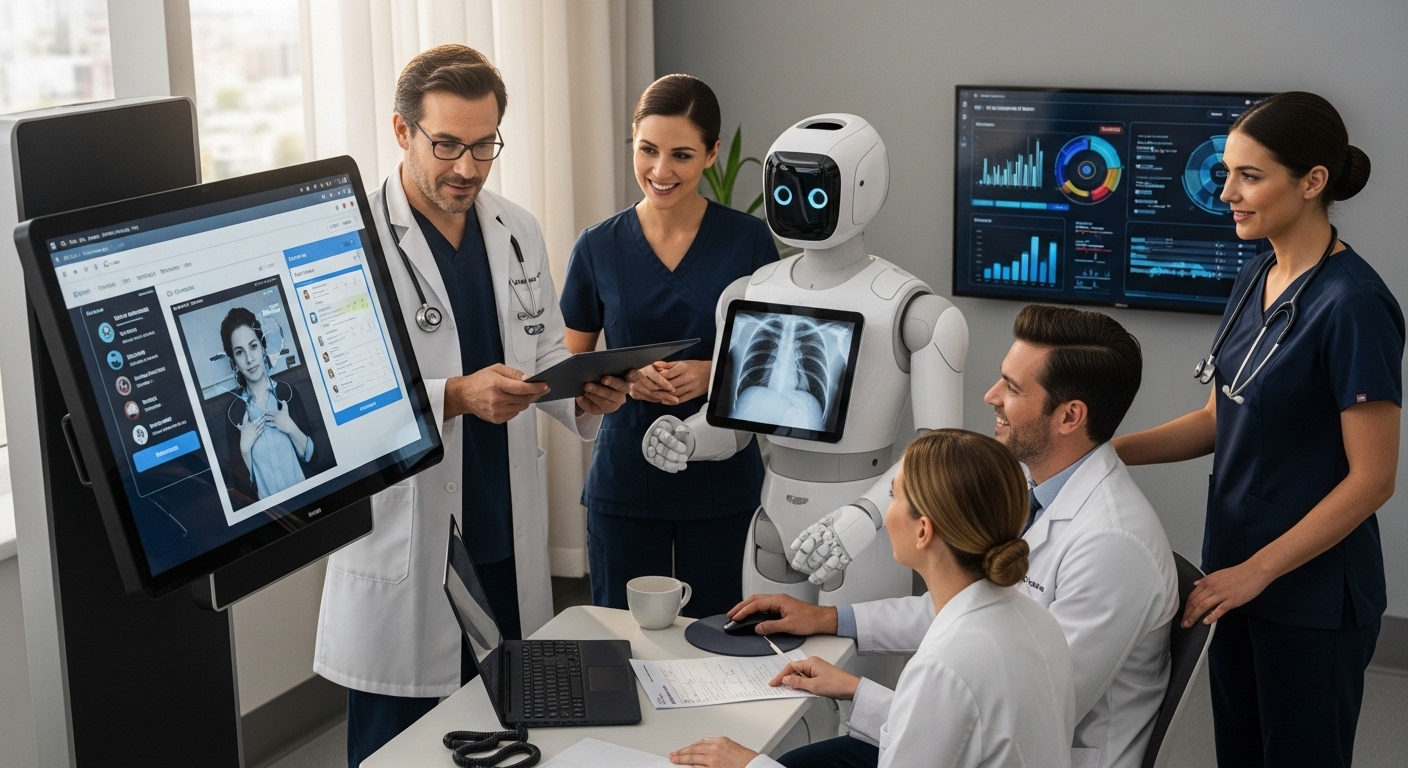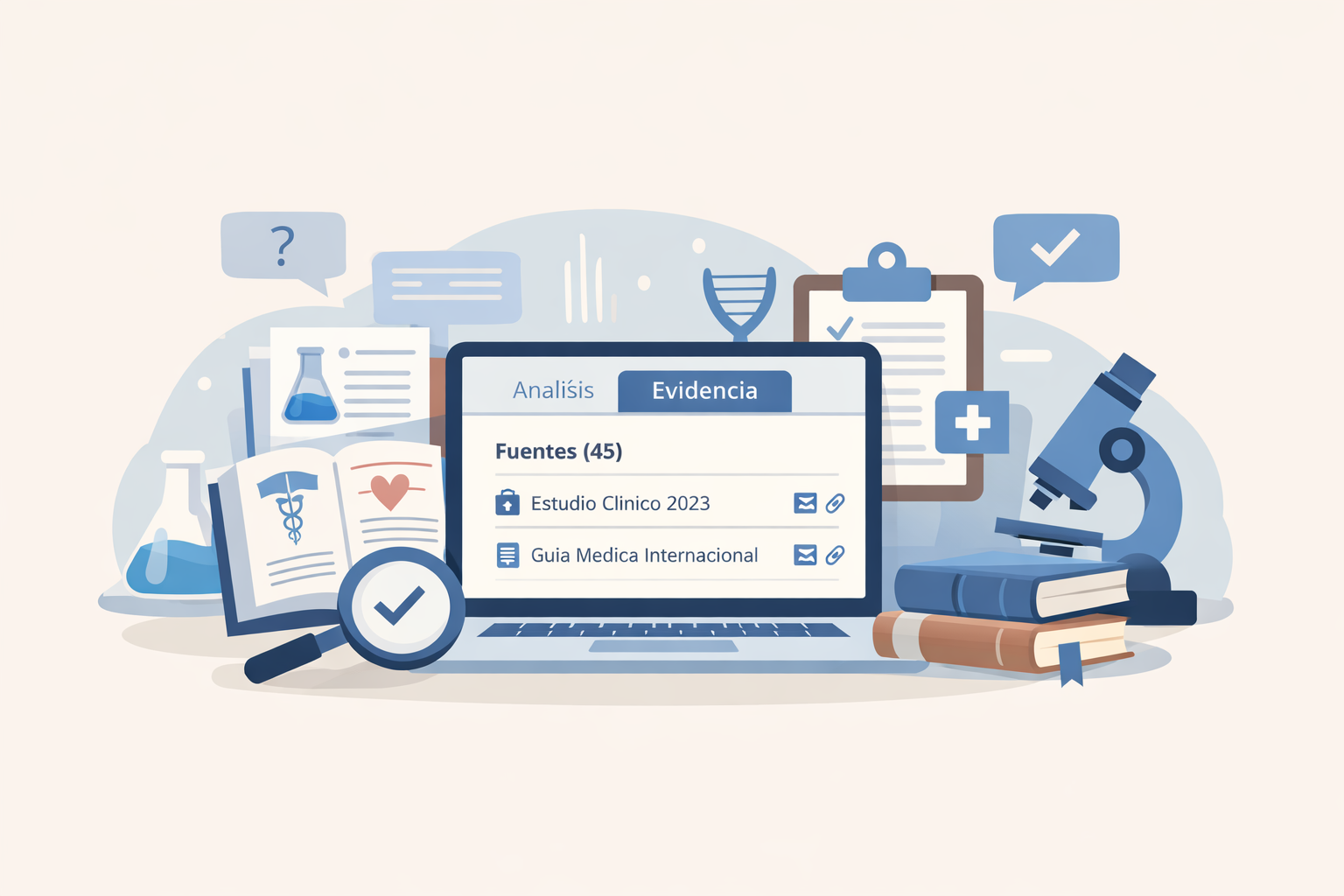Artificial intelligence is taking a leading role in modern medicine and is already driving major changes in hospitals around the world. However, many people do not realize that today's algorithms can analyze more than one million medical records in a matter of seconds and detect patterns that elude the best specialists. It is even more surprising to discover that these technologies not only speed up diagnoses, but are also capable of personalizing treatments and preventing diseases before the first symptoms appear.
Table of Contents
- Introduction to artificial intelligence in medicine
- Early diagnosis by means of ia algorithms
- Personalization of treatment with ia
- Improved clinical data management
- Use of ia in medical imaging
- ia tools for disease prediction
- Ethics and considerations in the use of ia in health care
Quick Summary
| Conclusion | Explanation |
|---|---|
| AI improves early diagnosis | AI algorithms make it possible to detect diseases at earlier stages, facilitating more effective interventions. |
| Personalization of AI treatments | AI helps to create specific treatments according to the individual characteristics of each patient, improving results. |
| Reduction of errors in data management | AI systems can reduce medical record errors by up to 60%, ensuring better quality clinical data. |
| Accurate detection in medical imaging | The algorithms can analyze radiographs and other studies with higher accuracy than the 95%, reducing diagnostic errors. |
| Ethical Considerations in the Use of AI | It is essential to evaluate the ethical impact of AI in medicine, ensuring privacy and autonomy in medical care. |
1: Introduction to artificial intelligence in medicine
Artificial intelligence (AI) is radically transforming the landscape of modern medicine. Since its first steps in the 1960s, AI has evolved from an experimental technology to a fundamental tool for physicians and healthcare professionals.
Its origins can be traced back to pioneering projects where researchers began to explore how machines could process medical information. According to research at Stanford University, the first medical AI systems were developed to perform basic diagnostics and analyze complex symptoms.
The main applications of artificial intelligence in medicine include:
- Advanced medical image analysis
- Disease risk prediction
- Accurate diagnostic assistance
- Personalization of treatments
- Automation of administrative processes
Today, AI not only complements medical work, but is also becoming a key partner to improve diagnostic accuracy and optimize treatments. Deep learning algorithms can process millions of medical data in seconds, something impossible for a human professional.
The integration of AI in medicine promises to reduce errors, accelerate research and create personalized solutions for each patient. MIT researchers point out that these technologies can detect subtle patterns in medical data that practitioners might miss.
To better understand this incredible technological breakthrough, explore our guide to artificial intelligence in medicinewhere we delve into its most revolutionary applications.
2: Early diagnosis by AI algorithms
Artificial intelligence algorithms are revolutionizing the ability of medical professionals to detect diseases at earlier stages, enabling more accurate and timely interventions. The early diagnosis has become a field where AI shows extraordinary potential.
Harvard researchers have demonstrated that AI systems can identify subtle patterns in medical data that escape even the most experienced clinical eye. This capability is particularly critical in diseases where early detection makes a significant difference in treatment outcomes.
The main advantages of early diagnostic algorithms include:
- Rapid analysis of large volumes of medical data
- Identification of predictive biomarkers
- Reduction of false negatives
- Personalization of prevention strategies
In cancer, for example, AI algorithms can examine radiological images with surprising accuracy. An MIT study revealed that AI systems can detect lung tumors with an accuracy up to 95% higher than traditional methods.
Predictive models not only analyze images, but also integrate multiple sources of information: genetic histories, clinical records, laboratory data and more. This multidimensional approach allows for a more comprehensive risk assessment.
More and more hospitals and medical centers are implementing these systems, transforming preventive medicine. See our guide to AI technologies to better understand how these tools are changing medical diagnostics.
3: Personalization of AI treatment
Artificial intelligence is transforming medicine from a generalized approach to one that is profoundly customizedThis revolution represents a quantum leap in medical care. This revolution represents a qualitative leap in medical care.
Stanford researchers have demonstrated that AI algorithms can analyze complex genetic, metabolic and clinical interactions to design individualized therapeutic strategies with unprecedented accuracy.
The main features of AI treatment personalization include:
- Detailed genetic analysis
- Prediction of drug response
- Individual risk assessment
- Adjustment of therapeutic protocols
In oncology, for example, AI systems can predict which treatments will work best for specific patients, reducing side effects and improving survival rates. A study at MD Anderson Cancer Center revealed that these algorithms can identify personalized treatment combinations with 87% accuracy.
AI-driven precision medicine is not only limited to cancer. In chronic diseases such as diabetes, hypertension or autoimmune diseases, algorithms can generate highly specific treatment profiles based on individual characteristics.
The benefits are multiple: reduction of side effects, optimization of medical resources and significant improvement in clinical outcomes. Find out more about these technological innovations that are redefining the future of personalized healthcare.
4: Improved clinical data management
Clinical data management has been radically transformed with the introduction of artificial intelligence, enabling more efficient, secure and strategic management of medical information. AI systems are revolutionizing how healthcare professionals collect, analyze and use patient records.
Researchers at Johns Hopkins Hospital have demonstrated that AI algorithms can reduce errors in medical records by up to 60%, significantly improving the quality and accuracy of clinical information.
The main advantages of AI in data management include:
- Automatic integration of medical records
- Instant detection of inconsistencies
- Advanced protection of sensitive data
- Optimization of administrative workflows
The systems of artificial intelligence process millions of records in seconds, identifying patterns, correlations and potential risks that would be imperceptible to traditional human analysis. According to an MIT study, these algorithms can reduce medical information processing time by up to 75%.
In the area of security, AI introduces critical layers of protection. Systems can detect unauthorized access, information handling anomalies and potential security breaches with unprecedented accuracy.
Discover how we automate the construction of medical records to understand the future of clinical data management. Technology not only simplifies processes, it fundamentally transforms them.
5: Use of AI in medical imaging
Artificial intelligence has revolutionized medical image analysis, enabling faster, more accurate and detailed diagnoses. Deep learning algorithms can examine X-rays, MRIs and CT scans with an accuracy that significantly surpasses traditional human capabilities.
Mayo Clinic researchers have demonstrated that AI systems can detect subtle abnormalities in medical images with near 95% accuracy, potentially reducing diagnostic error margins.
The main capabilities of AI in medical imaging include:
- Early detection of tumors
- Automatic injury classification
- Comparative analysis of disease progression
- Microscopic pattern identification
In specialties such as radiology and oncologyAI is demonstrating extraordinary capability. Systems can segment images, precisely measure lesion dimensions and predict tumor behaviors with astonishing accuracy.
A study published in Nature revealed that AI algorithms can identify breast cancer in mammograms with even greater accuracy than experienced radiologists, marking a turning point in diagnostic imaging.
The technology not only improves accuracy, it also significantly accelerates diagnostic processes. An analysis that previously required hours can be performed in minutes, allowing faster and more timely medical interventions.
Explore our AI solutions for medical image analysis and discover how technology is transforming diagnostic imaging.
6: AI Tools for Disease Prediction
Disease prediction using artificial intelligence represents an extraordinary advance in preventive medicine, making it possible to identify potential risks long before overt clinical symptoms develop. AI algorithms are transforming our ability to anticipate and prevent complex health conditions.
Harvard researchers have shown that deep learning models can predict the likelihood of developing chronic diseases with better than 80% accuracy, based on genetic analysis, clinical history, and lifestyle factors.
The main features of AI prediction tools include:
- Comprehensive genetic risk assessment
- Predictive modeling of disease trajectories
- Identification of subtle risk factors
- Generation of customized preventive strategies
In conditions such as diabetes, cardiovascular diseases and some types of cancer, the early prediction can literally be a lifesaver. AI systems can analyze thousands of variables simultaneously, detecting patterns imperceptible to traditional medical analysis.
A study published in Nature Medicine revealed that algorithms can predict heart disease risk with up to 10% higher accuracy than conventional methods, allowing earlier and more effective preventive interventions.
The benefits go beyond individual detection: these systems can identify population trends, helping health authorities to develop more effective prevention strategies.
Discover how our platform implements these innovations in advanced medical prediction.
7: Ethics and Considerations in the Use of AI in Health Care
The implementation of artificial intelligence in medicine not only represents a technological advance, but also poses complex ethical challenges that require careful and responsible evaluation. The intersection between technology and medical ethics has become a critical field of reflection and regulation.
Researchers from the World Health Organization have established fundamental frameworks to ensure that the use of AI in healthcare respects principles of human dignity, privacy and informed consent.
The main ethical considerations include:
- Protection of sensitive personal data
- Transparency in decision algorithms
- Prevention of discriminatory bias
- Maintaining the autonomy of the medical professional
- Guarantee of informed consent
One of the largest potential risks is the dehumanization of medical care.. AI systems should complement, not replace, human clinical judgment. A Cambridge University study warns of the dangers of over-reliance on automated systems that may lack the empathy and contextual understanding inherent in healthcare professionals.
Data privacy represents another fundamental challenge. Algorithms need large volumes of information to function efficiently, but robust protocols must be implemented to ensure the confidentiality and security of personal medical information.
The principle of non-maleficence should be the central axis of any technological development in healthcare. AI systems should be designed with human supervision mechanisms that allow intervention and correction of possible errors.
See our privacy and ethics policies to understand how we address these critical challenges in the implementation of medical artificial intelligence.
Brings artificial intelligence applied to the clinic with Itaca.ai
Are you concerned about the administrative burden, the risk of diagnostic errors, or the difficulty of maintaining secure data while leveraging AI in medicine? In this article you have seen how intelligent algorithms help automate records, improve diagnoses and personalize treatment. We know that running a clinic demands accuracy, speed and maximum confidentiality.
Explore our resources on AI healthcare applications in Guides Archives - Itaca to discover practical solutions and real cases.
Imagine your practice with automatic SOAP note generation, clinical decision support and efficient document management, all protected under the highest privacy standards. Don't miss the opportunity to transform your practice and eliminate day-to-day obstacles. Take the next step and try the tools of Itaca.ai to experience a more agile and secure clinical management. Also learn about our innovations in New Features Archives - Itaca to stay ahead of the curve today.
Below is a summary table that summarizes the main applications, benefits and considerations of artificial intelligence in medicine according to the article.
| Application/Area | Brief Description | Main Benefits | Highlights |
|---|---|---|---|
| Early diagnosis with AI | Algorithms that detect diseases at an early stage | More precise and faster interventions | Diagnostic accuracy superior to 95% |
| Personalization of treatments | AI analyzes genetic and clinical data to fine-tune individual therapies | Fewer side effects, better clinical results | 87% precision in personalized therapies |
| Advanced clinical data management | Automates, secures and improves the quality of medical records | Reduced errors, increased data security | Reduction of errors in 60% |
| Medical image analysis | Automatic lesion/tumor detection on radiographs and studies | Faster and more accurate diagnostic processes | Accuracy close to 95% |
| Disease risk prediction | AI models anticipate disease before symptoms become evident | Enables prevention and personalized health strategies | Risk prediction higher than 80% |
| Ethics and regulation in medical AI | Assessment of privacy, transparency and autonomy of medical personnel | Data protection, reduction of bias and assurance of consent | International ethical framework |
| Innovations and clinical automation | Record automation, note generation, clinical decision support | Administrative efficiency, reduction of burden and errors, increased confidentiality |
FAQ
What is artificial intelligence in medicine?
Artificial intelligence in medicine refers to the use of algorithms and computer systems to process medical information, improve diagnoses, personalize treatments and manage clinical data more efficiently.
How does artificial intelligence help in the early diagnosis of diseases?
AI algorithms can analyze large volumes of medical data to identify subtle patterns that indicate early-stage disease, enabling faster and more effective interventions.
What are the advantages of treatment personalization through AI?
AI makes it possible to design treatments tailored to the unique genetic and clinical characteristics of each patient, thus optimizing the efficacy of therapies and reducing side effects.
What are the main ethical considerations in the use of AI in healthcare?
Ethical considerations include the protection of personal data, transparency in algorithms, prevention of bias, and the need to maintain the autonomy of the medical professional in decision making.





Leave a Reply